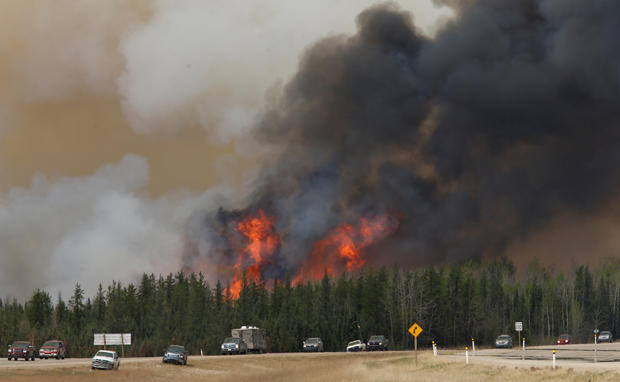Raging Canadian wildfire points to global warming
The wildfire that has devastated the remote Canadian town of Fort McMurray has caused an estimated $7.3 billion in insurance-related losses, the most from that type of disaster since 1970.
Experts say the size of the blaze, along with an increase in the number of wildfires in the U.S., are evidence of global warming.
"This is one of the parts of the world that has seen warmer and warmer winters and accelerated springs and drier conditions, which are linked to increasing atmospheric greenhouse gasses and the long-term warming that we've seen," said Glen MacDonald, a professor of geography at University of California at Los Angeles, in . "It's just not surprising that you would have an event like this."
In the U.S., wildfires have burned 1.5 million acres so far this year, compared with 316,000 in 2015, according to the Insurance Information Institute (III). Last year's conflagrations were fueled by the hottest summer on record and generated $1.5 billion in insured losses, the worst since 2007, the III says.
The fire season typically doesn't start for another month or two, according to Jessica Gardetto, a spokeswoman for the National Interagency Fire Center, which is forecasting an above-normal fire season this year.
"Usually, this time of year or even through the winter months, we will see most of our fire activity in Arizona or New Mexico, but they haven't seen that many fires this year," she said, while noting that Oklahoma has been hit.
According to media reports, entire neighborhoods in Fort McMurray were destroyed, along with parts of the downtown area of the city of 61,000. More than 80,000 people from the vicinity have been forced to flee ahead of the blaze. Canadian officials haven't asked for help from the U.S. to fight the blaze yet, though Washington will provide it if asked, Gardetto said.
Along with being potentially deadly, wildfires are financially costly. The Union of Concerned Scientists estimates that between 2000 and 2009, wildfires caused an average of $665 million in property damages per year in the U.S. The federal government spent more than $2 billion on fire suppression in 2015, the most since 1985 when records first started being kept.
U.S. government officials have hired more firefighters and purchased additional equipment in preparation for this year's blazes.
While the melting snowpack in higher-elevation areas like the Sierra Mountains has kept the ground moist enough to delay fires, areas at lower elevations, such as the rangelands in Nevada and Idaho, got less wintry precipitation than expected, Gardetto said.
"We are thinking that those areas are going to start to burn in the next month or so, creating the potential for an above-normal fire season," she said.
Wildfires in the western U.S. have gotten worse since the 1980s, increasing both in frequency and duration. According to the Union of Concerned Scientists, they burn more than six times the land area and last almost five times as long. Global warming is exacerbating the problem, the non-profit says.
"Nonetheless, because temperatures and precipitation levels are projected to alter further over the course of this century, the overall potential for wildfires in the United States, especially the southern states, is likely to increase as well," UCS says on its website.
